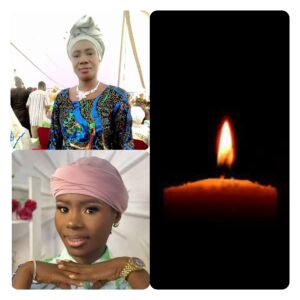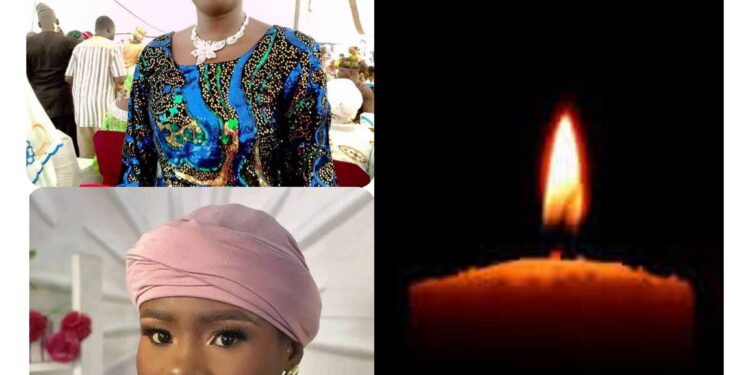
By Ibrahim Kegbegbe
In less than one week, Lagos State has lost two young women councillors — both freshly inaugurated, both symbols of hope in the long struggle to bring more women into politics.
On August 18, Honourable Zainab Adeshewa Shotayo, only 29, died after a brief illness. She was the only female elected councillor in Odiolowo-Ojuwoye LCDA, representing Ward C3, and had just taken office three weeks earlier as Chief Whip of the 6th Legislative Arm.
Barely five days earlier, Lagos had mourned Ms. Sabiu Oluwakemi Rufai, councillor for Ward C1, Ibeju-Lekki LCDA, who died just 16 days after her swearing-in.
Two deaths. Two women. Two voices silenced at the very moment Lagos had finally begun to respond to the call for greater inclusion.
A Push for Women, Led from the Top
This year’s local government elections were different. For once, women were not afterthoughts. The First Lady, Senator Oluremi Tinubu, had urged party leaders in Lagos to open space for women in every ward. The state’s ruling All Progressives Congress (APC) responded with record numbers: 124 female candidates were fielded for councillorship and chairmanship seats. The Lagos electoral commission (LASIEC) also waived form fees for women, youths, and persons with disabilities — a bold administrative step that widened the gate of access.
READ ALSO:Makinde Donates SUV to Yinka Ayefele After Fresh FM Fire Incident
These reforms gave women like Shotayo and Rufai a fighting chance — and they took it. Their victories were proof that when barriers are lowered, women can and will lead.
Why We Need More Women in Governance
The deaths of these two councillors should not obscure the broader truth: Lagos and Nigeria need more women in governance. The reasons go beyond fairness; they go to the heart of good leadership.
Women shift priorities to real needs. Global studies show that women in local office often prioritize basic services — water, health, sanitation, schools — the very things LGAs and LCDAs are mandated to deliver.
They strengthen accountability. Evidence suggests that women’s participation is linked to greater trust and less tolerance for corruption, especially in grassroots institutions.
They inspire society. When girls see women in authority, they learn that leadership is not a man’s preserve. Representation changes not only policy but possibility.
They balance governance. With men dominating nearly every tier of government in Nigeria, female voices bring perspectives rooted in community care, family welfare, and inclusive decision-making.
Globally, women now hold over 35% of local government seats on average. In Nigeria, the figure remains dismally low. In the House of Representatives, women hold just 3.9% of seats. Lagos’ modest gains in this year’s local elections matter because they can set a new tone for inclusion across the federation.
The Tragedy, and the Way Forward
The untimely deaths of Shotayo and Rufai are painful reminders of the fragility of life. But they must not become setbacks in the struggle for gender equity.
The best way to honour their memory is to protect the progress they represented:
1. Institutionalise inclusion. Make party fee waivers and ward-level female prioritisation permanent policy, not temporary favours.
2. Support councillor welfare. Provide routine health checks, counseling, and security support for councillors — especially first-term officeholders who bear heavy community demands.
3. Mentorship pipelines. Pair young female councillors with experienced mentors and provide technical support for legislation and constituency projects.
4. Transparent replacements. Where women’s seats fall vacant, parties should commit to replacing them with female nominees where possible. This sustains momentum instead of rolling it back.
5. Civil society vigilance. Advocacy groups and the media must keep attention on women’s representation and hold parties accountable for promises.
A Call to Lagos Leaders
The First Lady’s counsel has already borne fruit. Now Lagos leaders must not let grief erase that progress. Instead, they must double down — not only to console the families and wards left behind, but to guarantee that more women will rise to lead at the grassroots.
Hon. Zainab Adeshewa Shotayo and Ms. Sabiu Oluwakemi Rufai were not mere statistics. They were pioneers in spaces where women are too few. Their service was short, but their significance is lasting.
READ ALSO:Who Owns Yorubaland? Alaafin and Ooni Lock Horns Over Pan-Yoruba Title
Let Lagos mourn them. But let Lagos also learn from them.
Because if women remain missing in our councils, Nigeria’s democracy will remain unfinished.
















